Is eBay a Scam?
Laura Martisiute
Reading time: 11 minutes
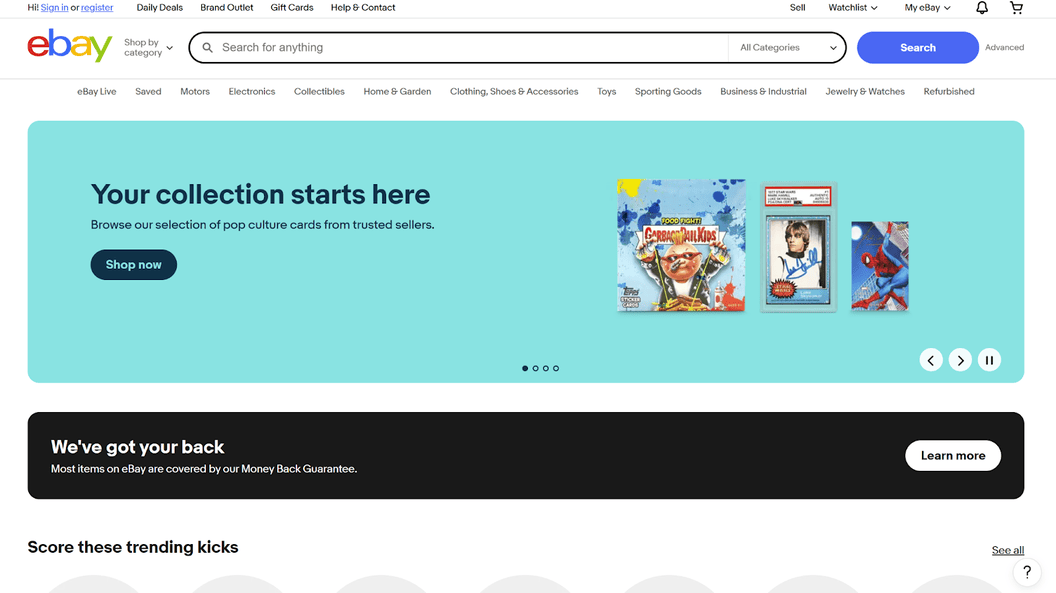
Table of Contents
If you’re thinking of buying from eBay, you need to know: Is eBay a scam?
Below, we explain whether eBay is a scam and discuss some steps you can take to improve your safety when buying from this marketplace.
What Is eBay?
eBay is an online marketplace where individuals and businesses can list various items for sale, and buyers can purchase them.
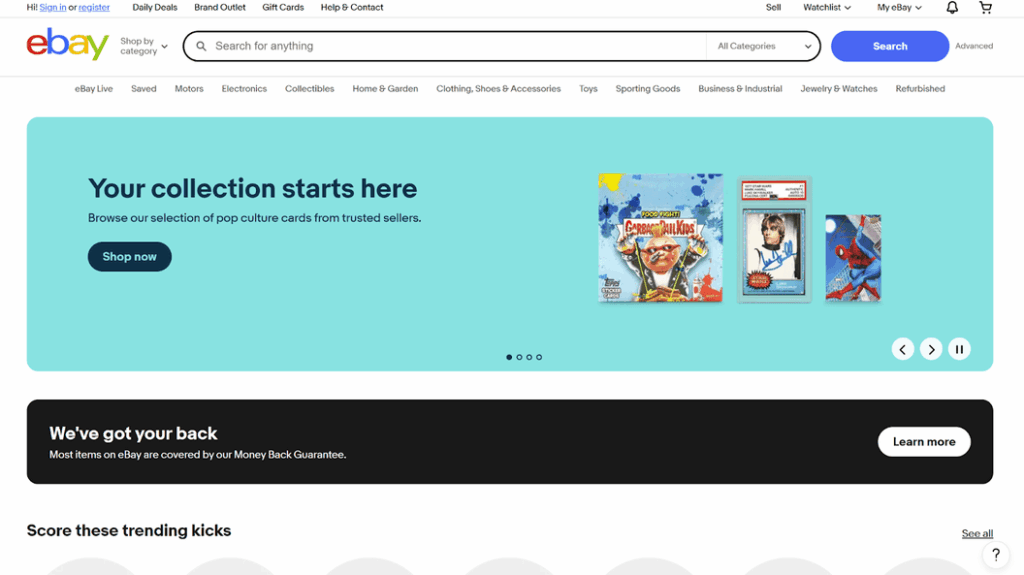
It was founded in 1995.
Initially, it was auction-based only, but now includes fixed-price sales as well. Item categories range from antiques and fragrances to car parts and clothing.
eBay is available in multiple countries and is one of the best-known e-commerce platforms in the world.
Is eBay a Scam?
No, eBay is not a scam. It’s a popular e-commerce platform that has been around for a few decades.
User reviews on eBay are mixed:
- 4.1 out of 5.0 stars (from 4.94m reviews and 100m+ downloads) on Google Play.
- 4.8 out of 5.0 stars (from 4.86m reviews) on the App Store.
- 1.2 out of 5.0 stars (from 15,496 reviews) on Trustpilot.
- 1.1 out of 5.0 stars (from 5,429 reviews) on Consumer Affairs.
- 3.1 out of 5.0 stars (from 4,099 reviews) on REVIEWS.io.
- 1.6 out of 5.0 stars (from 3,486 reviews) on Sitejabber.
Complaints include missing packages despite “delivered” status, poor customer service, account suspensions, high fees, and convoluted return processes.
On internet forums like Reddit, people generally report positive experiences while using eBay.
For example, one person said: “Been using for 10+ years and have never had a bad experience buying.”

Users recommend purchasing from established sellers who have recent and past positive feedback for items in the same category you want to buy.
eBay scams
As is the case with any marketplace, it is possible to encounter scams on eBay.
Common eBay scams include:
- Phishing emails that, at first glance, appear to be from eBay but are actually scams designed to trick you into sharing your details or login credentials.
- Tracking number scams where a seller gives a buyer a fake or invalid tracking number to make it look like the item they bought is being delivered and delays disputes. The goal is to get the buyer to miss the window for opening a dispute.
- Customer service scams that involve scammers creating websites that list fake eBay customer service phone numbers. Users who Google eBay customer service contact details and call these fake numbers usually don’t realize they’ve been scammed until it’s too late.
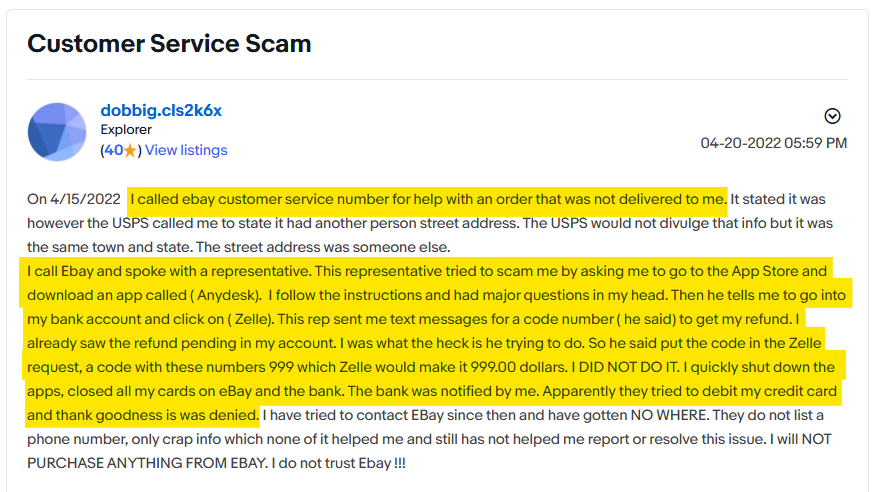
If you’re not sure whether something is a scam or not, you can always ask on the eBayScams subreddit.
Returns
Many eBay listings allow returns, but the exact terms and conditions depend on the seller’s policy, including how long you have to request a return.
Who pays the cost of return shipping depends on the seller’s policy and why you’re returning the item.
If the seller doesn’t accept returns but the item you received is faulty, doesn’t match the description, or arrived damaged, you may still be eligible for the eBay Money Back Guarantee.
When you ask for a return, the seller has 3 days to respond. If they don’t, you can ask eBay to intervene.
eBay Money Back Guarantee
Even if the seller you purchased something from doesn’t allow returns, you may still be able to return the item and get a refund thanks to the eBay Money Back Guarantee.
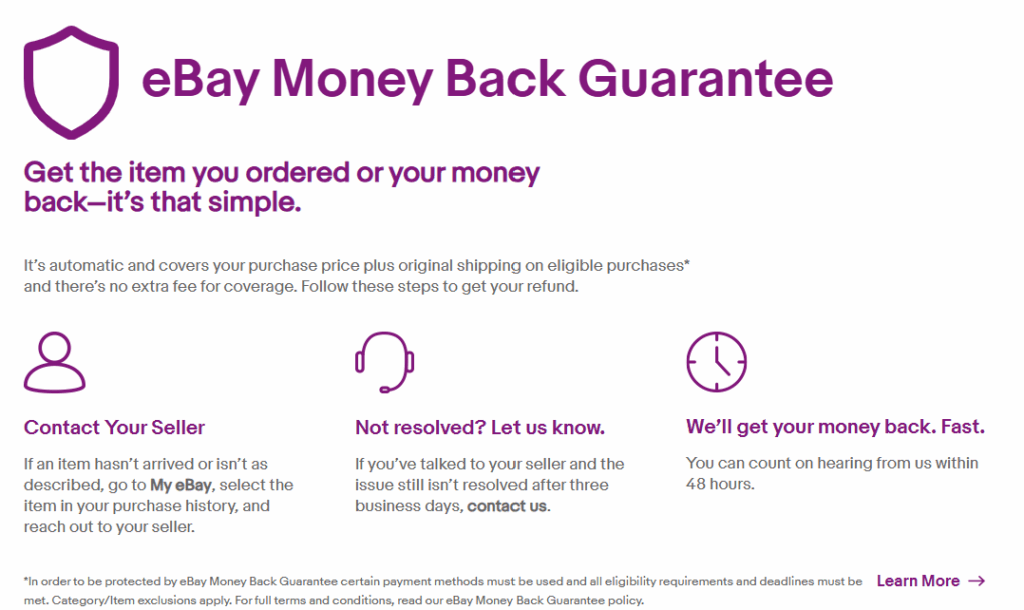
The eBay Money Back Guarantee applies if you didn’t receive the item or the item doesn’t match the listing. It also applies if the seller doesn’t fulfill their return policy.
However, certain conditions must be met. For example, you must complete and pay for the item on eBay using an eligible payment method (e.g., debit card, credit card, PayPal, Apple Pay) and take action within specific time frames.
Note that some items may be an “excluded item.” These include travel tickets, digital content, and sports trading card case breaks.
Security
In its privacy policy, eBay states that it employs “technical and organizational” security measures to safeguard your personal information.
These measures include network security services, data encryption, physical access restrictions to their data centers, and logical access controls for data and systems access.

Elsewhere on its website, eBay states that your payment information is secure when you purchase items from sellers and is never shared with sellers.
It also lists the additional security controls it has in place and notes that it maintains a Level 1 Certification according to the Payment Card Industry Data Security Standards.
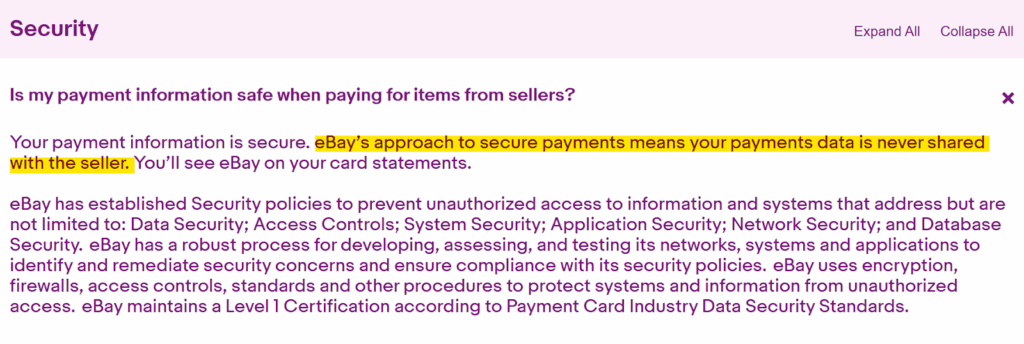
In 2014, eBay suffered a massive data breach in which attackers gained access to 145 million records, with “a large part” of the data being copied. The scale of the incident prompted investigations by several state attorneys general.
See also: Is eBay safe?
Privacy
eBay explains the type of data it collects, why it collects it, and with whom it shares it in its privacy notice.
It collects the following personal information:
- Data you provide, e.g., name, address, phone number, email address, tax identification number, additional identification data (if you’re a seller), information about bids and purchases, content you share with others through eBay’s messaging tools, financial information, shipping information, billing information, age, gender, country of birth, nationality, employment status, family status, interests, preferences, country of residence, data you add to your eBay account or share through a web form, and other data eBay is required/entitled to collect by law.
- Data eBay collects automatically when you use its services, e.g., transaction amounts, time and location of transactions, form of payment, payment method, currency preference, account activity, interactions with eBay services, advertising preferences, communications with eBay, location data, settings of your camera, and computer and connection information.
- Data from cookies and similar technologies, e.g., pages you visit, access time, frequency and duration of visits, links you click, activities and interaction with eBay advertising partners, user segment or category you fall into (such as “20-49 years old, interested in sneakers”), model or device type, browser type, device ID, advertisement DI, cookie-related data, IP address, location data.
- Personal data from other sources, e.g., public sources, credit agencies or bureaus, data providers, and government or other sources.
- Social network data you share with eBay, e.g., content you viewed and information about ads you’ve been shown or clicked on.
eBay collects and processes your personal data to fulfill its contractual obligations (e.g., enabling transactions and support), comply with legal and regulatory requirements, protect vital interests, pursue legitimate business interests (like fraud prevention, service improvements, and marketing), obtain your consent where required (e.g., precise location or biometrics), share data within the eBay family and payment partners, and power necessary automated decisions.
It states that it retains your personal data only as long as it’s needed to provide its services and meet legal, contractual, or consent-based obligations, after which it either deletes or anonymizes it.
The company warns that other users can access anything you share on the platform. For example, your purchases, bids, items for sale, saved interests, product reviews, comments, and similar.
Another thing to note is that every message you send through eBay’s built-in chat or “@ebay.com” email addresses goes first to eBay’s servers, where it’s automatically screened for spam, viruses, phishing links, or banned content. If a message trips those automated filters, it may be flagged for a human review.
Additionally, eBay utilizes artificial intelligence (AI) to enhance your experience, which may involve the processing of your personal data.
It says: “Where permitted under applicable law, we use personal data collected from our users to train, test, validate, and align our own AI models as well as third-party AI models and systems.”
eBay notes that it takes appropriate steps, such as filtering and data masking, to mitigate any potential privacy impacts from using AI.
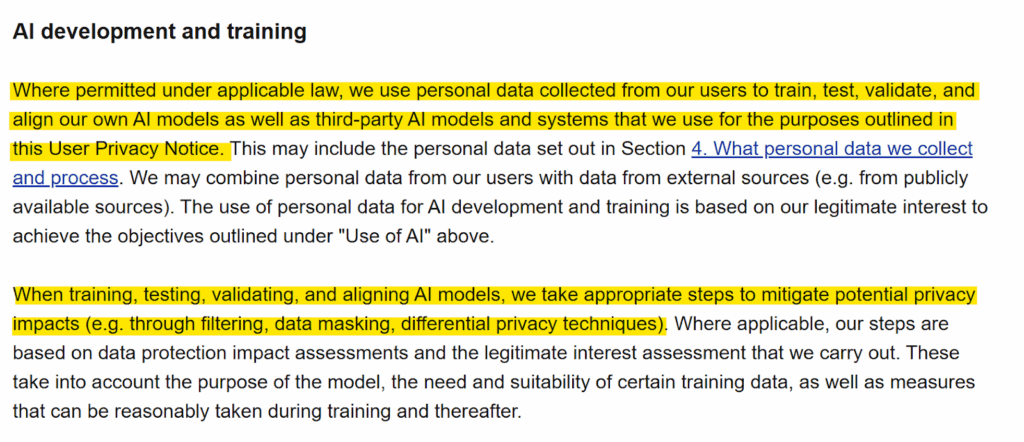
Depending on where you reside, you may have the right to access, rectify, erase, restrict processing, and obtain data portability of your data.
Terms of Service; Didn’t Read (ToS;DR), a project that rates internet services’ terms of service and privacy policies, gives eBay a “Grade E.” This is the worst grade and means “The terms of service raise very serious concerns.”
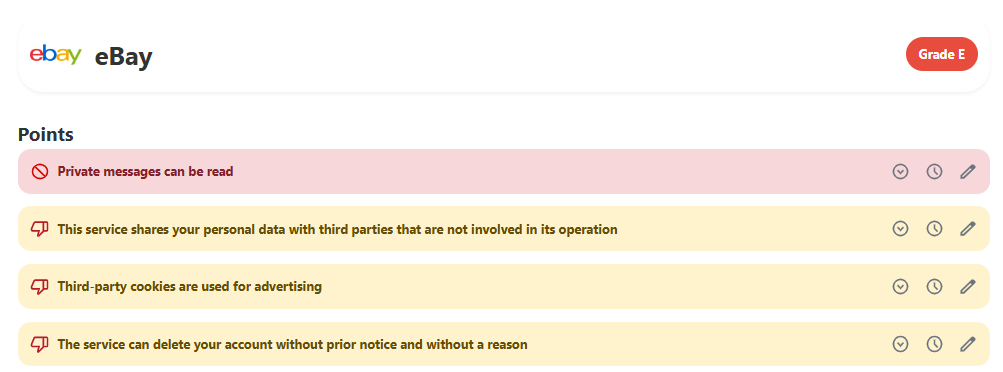
Some of the concerns listed include the following:
- eBay can read private messages.
- It shares your personal data with third parties not involved in its operations.
- It uses third-party cookies for advertising.
- It processes and stores your data in a country that is less friendly to user privacy protection.
- It uses your personal data to employ targeted third-party advertising.
On the plus side, it says that:
- When eBay wants to make a material change to its terms, users are notified at least 30 days in advance.
- You can opt out of promotional communications at any time.
- It prohibits the publishing of personally identifiable information without the owner’s consent.
Similarly, the Common Sense Privacy Program assigns eBay a rating of 60% out of 100%, which is classified as a “Warning” rating. It means eBay “Does not meet our recommendations for privacy and security practices.”

Some of the issues flagged by the Common Sense Privacy Program include eBay selling or renting data to third parties and displaying behavioral or targeted ads.
Privacy lawsuits
As of 2025, eBay is facing potential lawsuits in California over allegations that it shared customers’ private information with third parties without obtaining proper consent, potentially violating state privacy laws, including the California Invasion of Privacy Act (CIPA).
Law firms claim that eBay used third-party tracking software to collect detailed user data without providing users with adequate knowledge or gaining their consent.
So, Should You Use eBay?
Probably.
It’s a well-known e-commerce platform offering a vast selection of items, robust buyer protections, and competitive pricing.
However, you do run the risk of encountering occasional scams.
Also, before you shop on eBay, make sure you’re okay with the company’s data-collecting and data-sharing practices.
How to Use eBay Safely and Privately
- Check seller reviews. Stick to sellers with high positive ratings and recent sales in your item’s category. When reading past customer reviews, look for mentions of late deliveries or unresponsive customer service.
- Pay through eBay. Always use eBay-approved methods (credit/debit card, PayPal, Apple Pay, or Google Pay) to ensure the Money Back Guarantee applies in the event of an issue.
- Dispute immediately. If an item shows “Delivered” but hasn’t arrived, open a claim as soon as possible. Never wait for extra tracking updates. This is a common scam.
- Turn on two-factor authentication. eBay offers two-factor authentication, so be sure to turn it on to add an extra layer of protection to your eBay account.
- Create a strong password. And don’t reuse it elsewhere online. There have been reports of individuals whose eBay accounts were compromised because they used the same password for multiple online services.
- Monitor eBay login activity. Periodically check recent sign-ins for any suspicious activity.
- Share minimal information. Don’t give any unnecessary personal details in messages.
- Avoid off-platform requests. Never send payment or personal data outside of eBay’s messaging or payment system.
- Opt out of marketing. You can do this by going to Communication Preferences in your eBay account and turning off promotional emails and SMS.
- Control cookies. Block or delete third-party cookies in your browser (or use a privacy extension) to limit ad tracking.
- Review ad preferences. On the Ad Choices or Advertising Preferences pages, adjust or turn off personalized ads.
- Verify eBay emails. Scammers like to impersonate eBay, so be wary of any emails you don’t expect.
- Be cautious of calls claiming to be from eBay. As eBay says on its website, it is unlikely to call you. If you get a call from someone claiming to be an eBay representative, hang up and/or don’t call back. If you’re not sure whether the call was genuine, check your eBay messages. If it is genuine, eBay will also send you an email to your eBay messages.
- Report phishing attempts. Whether it was a phishing email or call, you can report it to spoof@ebay.com. For phone calls, email the details of what the caller asked and the number they called from. For emails, forward them to the eBay email address.
Our privacy advisors:
- Continuously find and remove your sensitive data online
- Stop companies from selling your data – all year long
- Have removed 35M+ records
of personal data from the web
Save 10% on any individual and
family privacy plan
with code: BLOG10
news?
Don’t have the time?
DeleteMe is our premium privacy service that removes you from more than 750 data brokers like Whitepages, Spokeo, BeenVerified, plus many more.
Save 10% on DeleteMe when you use the code BLOG10.

















